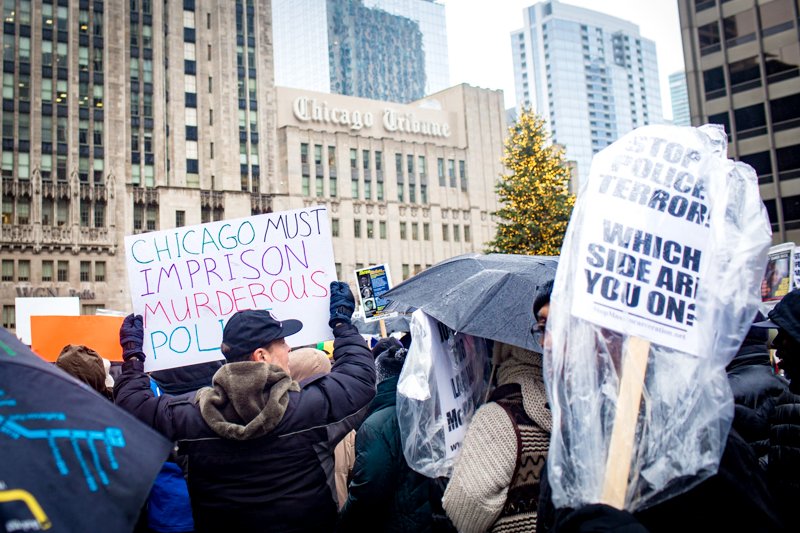Trump's Win Could Halt Police Reform Efforts In Chicago
By Emma G. Gallegos in News on Nov 14, 2016 7:43PM

Last year's Laquan McDonald protest (Photo by Braden Nesin/Chicagoist)
One of the most concrete ways that Donald Trump's presidency could affect Chicago almost overnight is in its efforts to reform its police department. The Department of Justice opened an investigation into the city's police department last year in the wake of a video showing Laquan McDonald being gunned down police.
As with many aspects of his campaign, Trump has offered few specific policy details on the subject of law enforcement. During his debates with Hillary Clinton, he repeated that he was the "law and order" candidate and expressed an admiration for racist "stop and frisk" policies that have been deemed unconstitutional. But everyone is expecting big changes when Trump is sworn into office:
The DOJ is about to be blown apart.I hope #Baltimore gets away from the pandering of community policing and back to focused enforcement.
— Tony Barksdale (@deputybarksdale) November 9, 2016
Even though Chicago's crime issues have become something of a punching bag for Republicans and Trump himself, the president-elect has said that the federal government should take a more hands-off approach to local law enforcement. In a written response to questions from the International Association of Chiefs of Police (pdf), he wrote, "National attention does not mean national involvement of the federal government. If a state or local jurisdiction asks for help from the Department of Justice or other federal agency, then my administration will assist. Otherwise, local issues should remain local."
This approach would represent a 180-degree turn from the Department of Justice's Civil Rights Division under Obama. His administration has used its executive power to go after local police departments accused of violating civil rights more aggressively than either Bill Clinton or George W. Bush—particularly since the death of Michael Brown in Ferguson at the hands of police and the ensuing riots in 2014, according to the Guardian.
Decrees that are already in place in cities like Miami, Newark and Seattle would be to reverse and would likely to continue under Trump, William Yeomans, a former senior official of the Civil Rights Division, told The Marshall Project.
However, he says ongoing investigations into cities like Chicago or Baltimore could be dropped or drastically reduced in scope. This especially true given the kinds of candidates that have been shortlisted for U.S. Attorney General, like Rudy Giuliani, Chris Christie and Florida Attorney General Pam Bondi. Yeomans told The Marshall Project, "I can't imagine anyone less sympathetic to police enforcement to Giuliani."
If the current administration hurries up and finishes its report on Chicago and other cities by January, experts say it would be tough for the incoming administration to ignore. Former federal prosecutor Jeffrey Cramer tells WBEZ, "At that that point the new administration is going to have … a pretty scathing report, and it’s going to be dumped in their lap. And it’s going to be pretty hard to ignore that no matter who the attorney general is."
If the Obama administration doesn't finish up their report in time, that could leave Chicago's efforts at police reform in limbo. Mayor Emanuel initially balked at federal oversight before he changed his mind. That's not surprising given that Emanuel likely suppressed the release of the Laquan McDonald tape until after a bruising reelection.
Chicago Police Board President Lori Lightfoot told WBEZ that she believes reform efforts will continue no matter what happens at the DOJ. But Cramer says federal pressure is necessary to make lasting change in the department: "The Emanuel administration can try and put through certain things...but at the end of the day, it’s going to be hard to implement the necessary changes around police reform without a federal judge, a federal consent decree and a monitor...being implemented by the federal government."